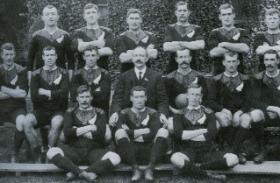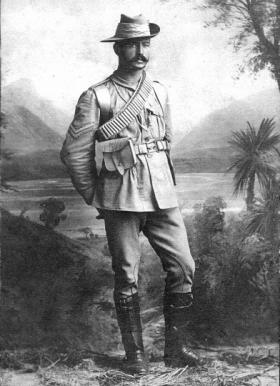From the files of the DIB…The Ramelton ‘rover’
Published in 18th–19th - Century History, 20th-century / Contemporary History, Issue 3 (May/Jun 2006), News, Volume 14
Dave Gallaher (centre, holding the ball) captained New Zealand’s first touring team to Europe in 1905.
GALLAHER, David (Dave) (1873–1917), rugby footballer, was born on 30 October 1873 at Ramelton, Co. Donegal. Emigrating to New Zealand with his family in 1878, he lived at Tauranga before settling in Auckland. Educated at Katikati School, he showed an early aptitude for rugby and, at 6ft tall and weighing 13 stone, soon played for club side Ponsonby. A wing forward, or ‘rover’, in a scrum system only employed by New Zealand rugby teams, he moved between backs and forwards at will, giving the feed to scrums and taking part in line-outs. Making 26 appearances for Auckland between 1896 and 1909, he interrupted his career to volunteer for the Boer War in 1901, returning to New Zealand with the rank of regimental sergeant major in 1902.
A taciturn pipe-smoker with a bull neck, Gallaher imposed military discipline on his teams. He was captain of New Zealand in their first ever rugby international, played against All Australia at the Sydney cricket ground on 15 August 1903. New Zealand won 22–3. He took his motto of ‘Give nothing away, take no chances’ to Great Britain, Ireland and France as captain of New Zealand’s first touring side, leaving Wellington on the liner Rimutaka on 30 July 1905. Earning themselves the name of All Blacks because of their kit, New Zealand lost only one of their 35 tour matches under Gallaher’s captaincy, a 3–0 defeat to Wales (16 December 1905). Gallaher was deeply disappointed to be injured and miss the test against Ireland (25 November 1905), a 15–0 victory for New Zealand and the world’s first all-ticket international match owing to the visitors’ popularity. The team’s return journey included exhibition matches in Brooklyn, Berkeley and San Francisco, all of which they won. Gallaher’s sixth and last international appearance was against North America in 1906.

In his Boer War uniform.
A selector for the New Zealand rugby team from 1907 to 1914, Gallaher was selector/coach for Auckland from 1909 to 1915 and a coach for Auckland Grammar School. A freezing-works foreman by profession, he enlisted in the Auckland Battalion (22nd Reinforcements) in 1915, on the day he heard of his brother’s death on active service. He died of wounds during the third battle of Ypres on 4 October 1917 and is buried at Nine Elms cemetery, Poperinge, Belgium. Ponsonby Rugby Club inaugurated the Gallaher Cup in his memory in 1922 and it is still Auckland’s premier club rugby competition. The All Blacks played France in Paris on 11 November 2000 in memory of Gallaher and all his fellow New Zealand First World War casualties. This game inaugurated the Dave Gallaher trophy, which is awarded to the winner of the first match between France and New Zealand in any year. On 9 November 2005 a party from the All Blacks centenary touring side visited Ramelton and unveiled a plaque at Gallaher’s birthplace and another at Letterkenny RFC’s new ground, which was named Dave Gallaher Memorial Park.
Nicholas Allen is a former editorial assistant with the Dictionary of Irish Biography.
















